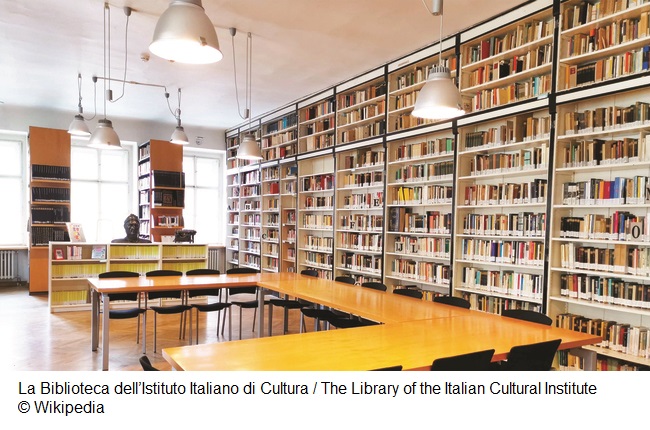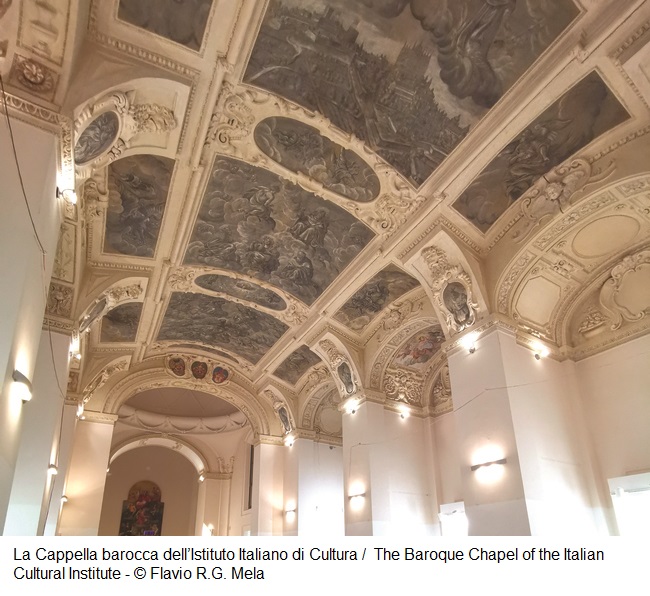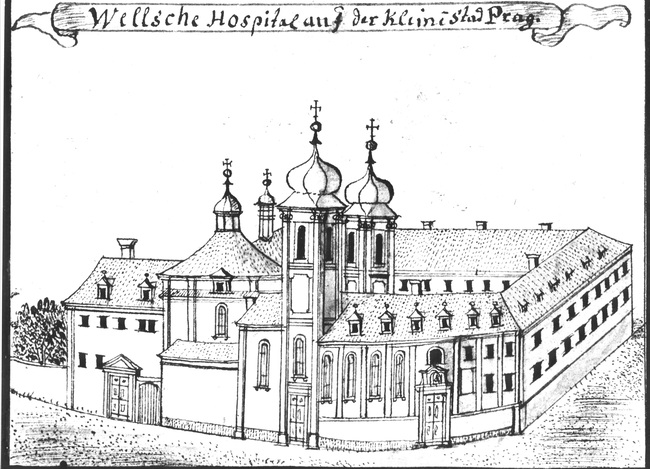From the 1970s to the future: a centre of irradiation of European culture
The hundred years of the Italian Cultural Institute in Prague (second part)
by Flavio R.G. Mela and Mauro Ruggiero

“Our cultural presence is surrounded by great prestige. We occupy a position of privilege that is viewed with frank envy by other western representations. We are the only ones who hold courses, who open a library and a newspaper library to the public without Czech control or interference, who offer cultural treats that are attended by such a wide audience.” This is what director Sergio Prato wrote in 1970 before handing the mandate over to Luciano Perselli who formalised a new cultural agreement between Italy and Czechoslovakia in 1971 where, although the Institute itself was never mentioned, it favoured “the activity of cultural institutions qualified to develop knowledge of the civilisation and culture of the other country, granting them the help and collaboration necessary for their functioning”. A status quo that saw an increase in attendance at the IIC, particularly for film screenings that counted as many as 50,000. Perselli described a relaxed atmosphere. “Our institution is spoken of with interest in the most qualified circles, it is visited frequently and without too many qualms. The Institute is able to set up important events and promote them in the best artistic institutions in the capital and the capital cities of Moravia and Slovakia. It has been possible to establish a favourable climate for many forms of cooperation, albeit within the limits and with respect for the social and political system of this country.”
In 1977, the political situation in Czechoslovakia worsened following the publication of the dissident Charta 77 against the oppressions of the regime, also creating a climate of increased control over foreign institutes. Perselli felt that many visitors to the IIC that year were persuaded not to visit the premises and that many local artists, involved in Italian cultural events, were warned against joining. Despite the difficulties, the Institute, acting with great diplomacy, managed to juggle the regime’s canvas, managing as early as 1978 to create significant collaborations with Czechoslovakian public institutions as well. In fact, as the newly appointed director Bruno Arcurio pointed out in that year, the IIC was the only representation beyond the curtain to guarantee a cultural offer, proposing itself “as a centre of irradiation and sum of European instances, at a time when a serious vacuum of what we usually call Western cultural values has arisen in this area.”
A bridge from Italy (1980s)
From the 1950s and throughout the 1980s, the Institute’s name was adapted to the regime’s various forms of abuse of power towards its role as Italy’s cultural representative. Tolerated but closely monitored by the Czechoslovak authorities, it was unable to use its official name, publicly falling back on other appellations such as the Biblioteca italiana (Italian Library) and, in the late 1970s, as the Cultural Office of the Italian Embassy. Whichever name it adopted, the IIC, at risk of total closure, never ceased to offer itself as a comprehensive institution with services of cultural promotion and language teaching, reciprocated by a passionate and courageous public, aware that it was under the scrutiny of political and judicial control bodies. In the early 1980s, the new regent of the IIC, Flavio Andreis, denounced a harsher stance by the local authorities, who were more explicitly against the presence of an Italian cultural institution, considering it illegitimate and outlawing language courses, the library service and film screenings, which, according to Czechoslovak law, normally fell under the responsibility of the state administration. In fact, the regime demanded to prohibit book lending and to submit the IIC’s activities to the Department of Cultural Affairs of the Czechoslovak Ministry of Foreign Affairs for pre- approval, organising them intra muros. In the logic of maintaining its role as a “window on the world”, as the Italian Ambassador to Prague, Giovanni Paolo Tozzoli, called it during those years, the IIC accepted, although not without discontent on the part of the Italian representation, the diktat imposed by the local authorities, leaving for example, the library service active only for those who wanted to use it for professional purposes, such as translators, teachers, editors and so on. The diplomatic tenacity of the preceding decades, the firm decision to open up to cultural exchange despite the interference of the totalitarian system and the perseverance in wanting to guarantee a temporary refuge of cultural recreation to the population against the oppression of the regime repaid the Institute, upon the collapse of the communist system in November 1989, with official recognition as the Italian Institute of Culture, from that moment on an institutional bridge at the service of rediscovered freedom, especially in the context of cultural exchange, which was then reinvigorated by the possibility of travelling to and from Italy without restrictions.
Entry into the new millennium
Following the Revolution and the “Velvet” divorce that marked the dissolution of the communist state of Czechoslovakia first, and the birth of the new independent Czech and Slovak Republics later, the Prague IIC was faced with the need to adapt to the changed political and social situation, to continue its mission of promoting Italian language and culture as well as possible. In the early 2000s, major renovation work was completed, including the complete re-roofing of the 17th-century building and the renovation of classrooms for language courses. The library was expanded, fully digitised, and supplemented with an online catalogue. Following the opening of the borders, and the Czech Republic’s subsequent entry into the European Union, the number of Czechs desiring to travel to Italy increased. The IIC was thus also a first port of call for tourist information and useful contacts for those wishing to visit the Belpaese. Publishing activities and cultural programmes in the various sectors have continued over the years, and new events have been added to the calendar to promote the ‘Sistema Paese’ in the fields of design, music, architecture, publishing, etc. The IIC joined the ‘Week of the Italian Language in the World’ and later the ‘Week of Italian Cuisine in the World’, organised by the Farnesina, in order to promote ‘Made in Italy’. Meanwhile, in 2011, the Cultural Agreement, first signed in 1971, was signed again between Italy and the Czech Republic. The IIC has intensified its efforts to finance the translation of works of Italian literature into Czech, and the support of chairs of Italian literature in the country’s universities. In the field of music, it has collaborated with festivals throughout the country, attended by world-famous Italian musicians. Much attention has also been paid to science and technology with exhibitions, conferences and other promotional events. As far as cinema is concerned, the Institute actively collaborates with the International Film Festival of Karlovy Vary and other Czech festivals, and initiates the annual ‘Mittel Cinema Fest’, the most important event for the promotion of Italian cinema in Central Europe, with stops in Prague and other Czech cities. Meanwhile, a permanent exhibition on the History of the Italian Congregation in Prague was also created in the Malá Strana building.
Towards the future, with the culture of the past and present
In a world of continuous and rapid change, where communication and new technologies play an increasingly important role, culture remains a fundamental bulwark and an essential element of Italian identity in the world, as a tangible and intangible heritage that can be drawn on to meet the challenges of the present and the future. The Italian Cultural Institute in Prague wants to be a bridge capable of connecting the cultural heritage of the past with its new forms and expressions. Cultural diplomacy, with the promotion of language, scientific research, architecture, music, art in all its manifestations, and Italian excellence in general, plays and will continue to play a fundamental and ever-growing role in Italian foreign policy, and will constitute one of the main instruments of external projection. For this reason, the IIC Prague wishes to continue, through consolidated and new instruments, its role of cultural promoter, and to continue to be a privileged place of exchange, meeting and dialogue for intellectuals and artists, for Czechs, Italians and anyone wishing to cultivate a relationship with Italy. The implementation of new technologies and social media has ushered in a new era in which organised events take place in hybrid form, in presence and online, effectively breaking down all borders. To coincide with the 100th anniversary of its foundation in 2022, the Institute has restored and enhanced its large garden and Baroque Pavilion, which from this year will be the setting for new cultural events. The Prague Institute is the first Italian Cultural Institute in the world to host an Italian cooking workshop to promote the Peninsula’s traditions and culinary excellence. The offer of language and culture courses will be enhanced to meet the latest demands and needs of students and, at the same time, relations will be strengthened with the world of publishing, music and film festivals, and above all with local universities and cultural institutions. As it has been doing for a century now, the Prague IIC will continue to work to strengthen cooperation between Italy and the Czech Republic, two nations, two peoples who can boast a friendship spanning centuries and who together, with Europe and the world, are preparing for the challenges that the future holds.






